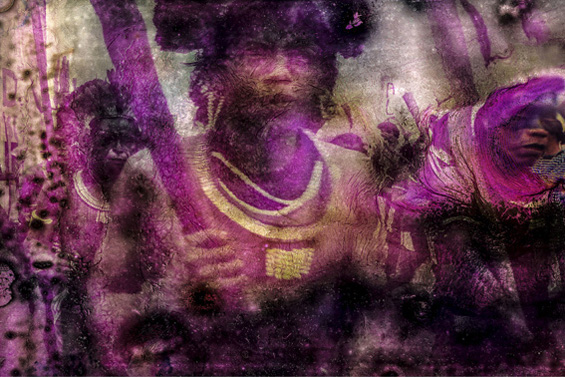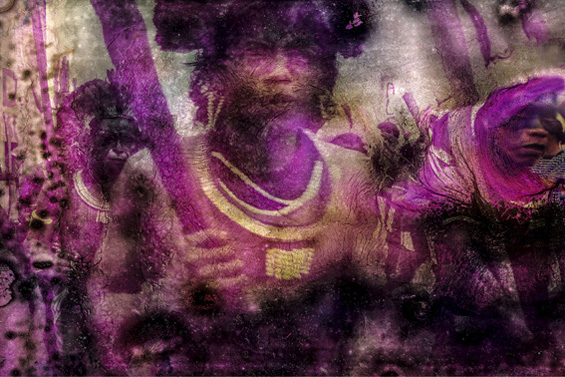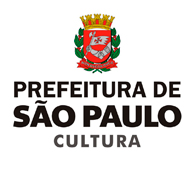
Exposição de Nair Benedicto
7 de novembro de
Um verso para o tempo interminável
Diógenes Moura, curador
Na sala da sua casa, no bairro da Vila Mariana, em São Paulo, Nair Benedicto me diz que nunca fez uma fotografia para ser a mais importante de todas as imagens: “Quero que seja a melhor representação do que estou vendo. Se você se liberta de tudo, a fotografia acontece. Determinadas fotos me dão tanta querência que não me preocupo com o ‘estilo’ em que ela poderá ser definida”. Em torno da mesa redonda onde estamos há o silêncio da sala, os livros, os pequenos bancos indígenas, os móveis de família, os retratos dos filhos, netos e antepassados, os vasos com galhos de urucum recolhidos no jardim.
Foi dali, próximo à janela, que foram feitas as duas últimas imagens que estão em Por Debaixo do Pano: uma cena impregnada de cinza, paulistana entre fuligem e capitalismo, com quase nenhum reflexo do janelão vazado por onde se vê o lado de fora da rua invertido, os prédios de cabeça para baixo. A fotografia foi pensada para finalizar a série sobre a ditadura militar. Foi daquela forma, presa ao pau de arara, que Nair Benedicto foi torturada, em 1969. Lá, sem nenhuma chance, ela enxergava o mundo ao redor virado ao contrário. Portanto, a série de imagens invertidas foi concebida para não esquecermos que cicatrizes não se transferem e que depois desse período de ‘guerra’ pelo qual passamos tivemos que espremer a liberdade para não sermos transformados em coisa pela sombra monstruosa dos que nos perseguiram durante 21 anos seguidos. Livre, Nair Benedicto escreveu sua história com as próprias mãos.
Por isso ela sussurra em cada uma das suas imagens, como um segredo guardado dentro do outro. Quanto mais olhamos, mais descobrimos. Nada em seu espaço visual fica parado no tempo. Parado na memória, sim. Como deve ser a verdadeira fotografia. O mundo está à beira, quase sem saída, impregnado por uma falsa moral digital, pífia, sinistra. Ultrapassar poderá ser um verbo futurista. Assim é Por Debaixo do Pano. O pensamento de uma artista diante dos seus dias: a mulher que se põe (despida) diante da nossa avassaladora existência humana. Esse, o contorno estupefato e ao mesmo tempo aveludado que conduz sua criação pelo menos nas últimas cinco décadas. “Trabalho com o que acho importante, com o que quero. Isso é um privilégio, estar diante do mundo e deixar que ele interfira no meu olhar. É essa sensação que provoca em mim o desejo de compartilhar o que vi e vivi. Atualmente as pessoas definem seus trabalhos a partir de resultados financeiros. Eu pude usar a minha paixão para traçar o meu destino, político, social”, disse-me outra vez com o seu jeito ciber-caboclo-pan-amoroso.
Nada em Por debaixo do Pano vaza para limites exteriores. Um título que estatela diante de nós a realidade falsamente camuflada e desnuda da nossa vida cotidiana rachada ao meio, onde a mentira e as palavras dissimuladas precisam ser incendiadas em cada amanhecer. Sabendo disso Nair Benedicto revê as famílias; as tribos indígenas; as manifestações populares; o grito dos movimentos nas ruas/o corpo/o gesto/o músculo da vida cotidiana em chamas; a coragem do outro no gênero possível, real, múltiplo e do próximo gênero que ainda está em construção. Olha adiante como olha para si mesma. Escreve numa exposição o lhe perturba nos tempos atuais. Por tudo isso Por Debaixo do Pano não é apenas fotografia: é também navalha na carne, a noite dos tempos, o corpo líquido, o músculo em chamas, um poema nascendo, o cinema transcendental, a garganta das coisas.
A verse for interminable time
In the room of her house, in the neighborhood of Vila Mariana, in São Paulo, Nair Benedicto told me that she never took a photograph for it be the most important image of all: “I want it to be the best representation of what I am seeing. If you free yourself from everything, the photograph happens. Determined photos overwhelm give me so that I am not worried about the ‘style’ in which it can be defined.” Surrounding the round table we are seated at is the silence of the room, the books, the small indigenous benches, the family furniture, the portraits of children, grandchildren, and ancestors, vases with urucum branches collected in the garden.
It was there, near the window, where the last two images in Por Debaixo do Pano were taken: a scene impregnated with grey, São Paulo between soot and capitalism, with almost no reflection in the large clear widow in which you can see the road outside inverted, the buildings upside down. The photograph was intended to finalize the series about the military dictatorship. It was in that way, tied to the pau de arara, that Nair Benedicto was tortured in 1969. There, without any hope, she saw the world around her turned upside down. Thus, the series of inverted images was conceived so that we will not forget that scars are not transferred and that after this period of ‘war’ which we went through we had to curb liberty in order not to be transformed into a thing by the monstrous shadow of what pursued us for the following 21 years. Free, Nair Benedicto wrote her history with her own hands.
For this reason she whispers in each of her images, like a secret kept within the other. The more we look, the more we discover. Nothing in her visual space is frozen in time. Frozen in memory, yes. As real photography should be. The world is on the brink, with almost no way out, impregnated by a falsa digital morality, despicable and sinister. Overtaking can be a futurist verb. Por Debaixo do Pano is like this. The thought of an artist facing what is going one: the woman who places herself (naked) in front of our overwhelming human existence. This, the astonished, and at the same time mellow, outline which had led her creativity for the last five decades at least. “I work with what I think is important, with what I want. This is a privilege, to be before the world and not let it interfere with my perspective. It is this sensation which provokes in me the desire to share what I have seen and experienced. Currently people define their work on the basis of financial results. I have been able to use my passion to trace my political and social destiny,” she told me on another occasion, in her cyber-Caboclo-pan-amorous manner.
Nothing in Por Debaixo do Pano escapes the exterior limits. A title which places before us the falsely camouflaged reality and strips bare our daily life torn in half, where the lie and dissimulated words need to be burned at every sunrise. Knowing this Nair Benedicto revisits families; indigenous tribes; popular events; the shouts of movements on the streets/the body/the gesture/the muscle of daily life in flames; the courage of the other in the possible, real, multiple genre and the next genre which is still being built. Looking ahead as well as looking to oneself. Writing to expose what disturbs her in the current day. For all of this Por Debaixo do Pano is not only photography: it is a razor blade cutting into the flesh, the night of time, the liquid body, the burning muscle, a poem being born, transcendental cinema, the throat of things.
Ventos na
superfície do oceano
Nair Benedicto
O que eu sempre quis na vida foi ser protagonista. Nasci em São Paulo. Meus primeiros 10 anos vivi no bairro da Liberdade. Os vizinhos eram descendentes de italianos como eu, ou espanhóis, negros, japoneses, árabes. Meu primeiro namorado foram dois irmãos japoneses. Sem drama! Num dos primeiros boletins de avaliação da ótima escola pública que eu frequentava, tentei transformar minha nota 3 em 8. Minha mãe foi chamada. Não fui punida pela escola, nem pela minha mãe (já viúva), mas percebi que estudar e aprender eram oportunidades que não deviam ser desperdiçadas.
Adolescente, arrumei correspondentes em vários países da América Latina, Europa e Ásia. Alguns deles conheci pessoalmente. Infelizmente, a polícia dos anos 1960, quando invadiu minha casa, apreendeu fotos e cartas desse período bonito da minha vida, como comprovantes de minha subversão. Formei-me em Rádio e Televisão cursando a FAAP e a USP. A ditadura dos anos 1970 tornou impossível o exercício da profissão nos canais normais. Tornei-me fotógrafa!
Tenho nojo ao ver pessoas empunhando bandeiras nas ruas e nas redes sociais pela volta dos militares. Mas é fácil de entender: 30 anos de ditadura, matança generalizada de lideranças rurais, operárias e estudantis. Exílio de cabeças pensantes como Paulo Freire, Oscar Niemeyer, Celso Furtado, Darcy Ribeiro e outros. Cargas tributárias sobre consumo e produção. Uma elite vivendo sem trabalhar, apenas administrando heranças e o próprio capital, habituada a tratar o bem público como se fosse privado, socializando dívidas e privatizando ganhos. A Constituinte de 1988 não chegou sequer a arranhar alguns problemas básicos: revisão das concessões dos meios de comunicação, reforma política, reforma agrária, imposto sobre fortunas. A Nova República nasceu morta, aglutinando os remanescentes da Ditadura. Deu no que deu!
Sou contra a corrupção. Mas ela precisa ser atacada sem cinismo nem hipocrisia. Corrupção é corrupção! Corrupto precisa deixar de ser apenas o OUTRO: o outro indivíduo, o outro partido, o outro time. Mensalão, trensalão, Banestado, Metrô de São Paulo, Vale do Rio Doce, compra de votos, sonegação de declaração do Imposto de Renda, subornos de guardas. A corrupção acaba com a noção do bem comum. Acaba com a política. Além da crise econômica e social, vivemos um momento de falta de representatividade. Na periferia, entre outras coisas aprendi que não existe bala perdida. A bala é artefato feito para matar. Não temos lei da pena máxima na legislação, mas ela existe na prática. A polícia em São Paulo e no país todo está matando: índios, líderes rurais, negros, mulatos e pobres de qualquer cor.
Apesar de tudo, as pessoas da periferia estão criando: música, poesia, grafites, literatura, contos. Votar de vez em quando não basta. Estão surgindo novos protagonistas, e isso incomoda demais nossa elite do dinheiro, dos filhos de sicrano, dos netos de beltrano. Essa elite quer vassalos, não interlocutores. Num dos audiovisuais que produzi nos anos 1980, sobre propriedade de terra e moradia, uma mulher, liderança dos favelados, terminou sua fala com uma frase que nunca esqueci: “Neste período todo de nossa luta, descobri que sou gente! E isto não tem volta!”.
Precisamos repensar os modos de vida. A sobrevivência exige muito mais que esse empedernido ser humano que se vê como o centro do Universo. Precisamos uns dos outros. Precisamos exercitar a tolerância que tanto nos está fazendo falta neste mundo impregnado de ódio, em que fomos atingidos pela mídia em geral. Tolerância não significa apenas o esforço de aguentar o diferente de nós. A diferença nos enriquece como seres humanos. Aprender a ser gente! Ir além do Homem. É em nome desse valor que devemos nosso respeito à terra, à água, aos animais, às arvores, às flores e a todos os viventes deste planeta onde vivemos. Já perdemos tempo demais. Mãos à obra!
Winds on the surface of the ocean
What
I always wanted in life was to be the protagonist. I was born in
As
an adolescent, I found correspondents in various countries in Latin America,
Europe, and
Seeing
people waving banners in the streets and the social networks calling for the
return of the military makes me sick. But it is easy to understand: 30 years of
dictatorship, the generalized killing of rural, worker, and student leaders.
The exiling of thinkers such as Paulo Freire, Oscar Niemeyer, Celso Furtado,
Darcy Ribeiro, and others. Tax burdens on consumption and production. An elite
living without working, only administering inheritances and their own capital,
used to treating public goods as if they were private, socializing debts and
privatizing profits. The 1988 Constituent Assembly did not even make a dint in
some basic problems: revision of concessions of the means of communication,
political reform, agrarian reform, wealth tax. The
I
am against corruption. But it needs to be attacked without cynicism or
hypocrisy. Corruption is corruption! The corrupt need to stop being only the
OTHER: the other individual, the other party, the other team. Mensalão, trensalão, Banestado, Metrô de São Paulo, Vale do Rio Doce, purchase of votes, evading tax in income tax
declarations, bribing police. Corruption
corrodes the notion of common good. It destroys politics. In addition to the
social and economic crisis, we are experiencing a moment of lack of
representativeness. On the periphery another thing I learnt was that there are
no stray bullets. A bullet is something made to kill. In our legislation there
is no capital punishment, but it exists in practice. The police in
Despite everything, the people from the periphery are creating: music, poetry, graffiti, literature, stories. Voting once in a while is not enough. New protagonists are emerging, and this really bothers our moneyed elite, the sons of so-and-so, the grandchildren of someone. This elite wants vassals, not interlocutors. In one of the audiovisuals I produced in the 1980s, about land ownership and housing, a women, a leader of the favelados, ended her talk with a phrase I have never forgotten: “In this time of our struggle, I discovered that I am someone! And there is no turning back!”
We need to rethink our way of life. Survival demands much more than this callous human being who sees himself as the center of the universe. We need each other. We need to exercise the tolerance which is so missing from this world impregnated with hated, in which we have been so affected by the media in general. Tolerance does not only mean the effort of putting up with what is different from us. The difference which enriches us as human beings. Learn to be people! Go beyond mankind. It is in the name of this value that we owe respect to the land, the water, the animals, the trees, the flowers, and to all the beings on this planet where we live. We have wasted too much time. Get to work!




